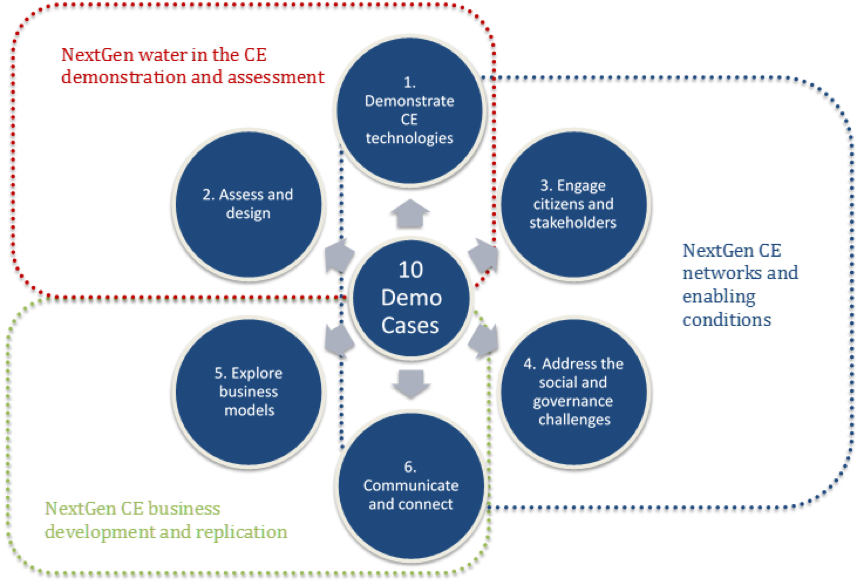About the project organisation
In practical terms, a series of work packages have been devised to make NextGen a reality. These are organised around the three key areas of action: demonstrate and assess, networks and enabling conditions, and business development.
Lead partners and key contact persons of each work package are:
- WP1 : Demonstrate CE technologies : Sandra Casas (CTM)
- WP2: Assess and design : Anders Nattorp (FHNW)
- WP3: Engage citizens and stakeholders : Jos Frijns (KWR)
- WP4: Address social and governance challenges : Heather Smith (UCRAN)
WP5: Explore business models : Alexandre Bredimas (STRANE)
- WP6: Communicate and connect : Alec Walker-Love (ESCI)
NextGen work packages in more detail
WP1 Demonstrating technologies & systems for water in the circular economy
WP1 will provide evidence to demonstrate the feasibility of innovative technological solutions supporting a circular economy (CE) transition in the water sector. Through activities to close the water, energy and materials cycles in 10 demo cases, WP1 will provide the necessary data to assess the benefits of the technologies (WP2). The specific objectives of WP1 will be to promote the feasibility and to prove the applied concepts in order to:
- Provide long-term credible data on performance of CE technologies and schemes for the water sector
- Derive guidelines for optimized operation of CE systems
- Highlight the potential for water reuse, nutrient & energy recovery depending on the local conditions.
WP2 Assessing technologies and design systems for water in the circular economy
WP2 will assess economic and environmental performance of individual CE water technologies and associated risks, optimise the systems and make assessment and modelling results and tools available in a sustainable manner. The specific objectives of WP2 are:
- To assess systemic eco-innovation and technology implementations in the demo cases and enrich the project’s evidence base
- To further develop, customize and demonstrate tools to support and foster replication of CE concepts beyond the project looking both at the individual technology and at the system levels, now and in the future.
WP3 Involving and engaging citizens and other stakeholders
WP3 aims at actively involving and engaging stakeholders from the whole water value chain, with a particular emphasis on end-users and the general public and will offer an engagement environment around the innovations demonstrated. WP3 will:
- Create and synchronise Communities of Practices to promote a multi-stakeholder approach to discuss CE water technologies in its institutional context
- Engage end-users and citizens in experiencing and visualising CE water technologies by demonstrating Living Labs outreach, AR and SG activities.
WP4 Addressing social and governance challenges to uptake of circular solutions for water systems and services
WP4 addresses the socio-political, regulatory and governance (pre)conditions for circular water systems and services and proposes an actionable EU Roadmap for Water in the CE. The objectives of WP4 are:
- To improve understanding of the social acceptability of circular water systems and services;
- To examine existing and emerging policy and regulatory frameworks, both at European level and within Member States, in order to identify enablers for, and challenges to, wider uptake of circular solutions;
- To inform emerging European policy on the CE for water by implementing a road mapping approach, in order to develop ways of addressing identified challenges.
WP5 Exploring new business models and supporting market creation
WP5 explores the development and demonstration of new CE business models and market opportunities, also supporting the emerging CE business ecosystem through water in the CE Market Place, firmly embedded into, and extending the outreach of WssTP’s real face-to-face water marketplace. WP5 has the following objectives:
- Develop new business models and ideate new services for CE, optimising and building on the NextGen demo cases
- Ensure a high-impact exploitation with the creation of a marketplace and spinoffs
- Select the more mature and close-to-market NextGen technologies/solutions and develop actionable Business Plans.
WP6 Communicate, connect, create synergies and support learning
Communication, collaboration and engagement are pillars of excellence and innovation on a par with our technical endeavours. Project communications are vital to supporting NextGen goals and WP6 will specifically seek:
- To promote active engagement and knowledge sharing between 10 demo cases, project partners, 30 end users, a range of professional stakeholders and engage with 50,000 citizens
- External communication and promotion of the project evidence base, case studies, experiences and outcomes, so as to widely promote the principals of NextGen
- To establish a knowledge legacy as an ongoing platform to promote and share the principals of the project to support creation of 3 new spin offs, new business opportunities and 200 long-term jobs in water supply.
